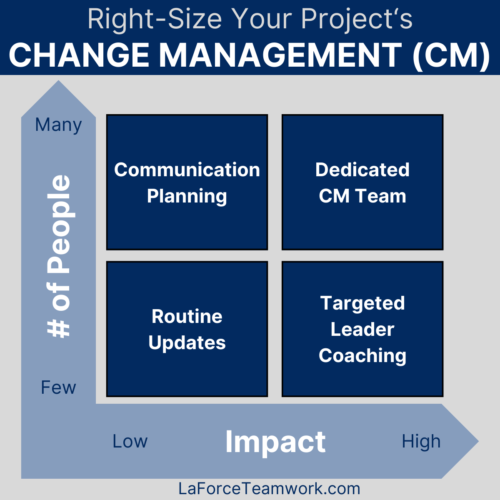Not all projects require change management, but some most definitely do. There are two main questions to answer when deciding how much change help your project needs:
- How much impact will this change have on people?
- How many people will need to change?

Heavy Change Management Projects
Let’s examine the projects that fall into the upper right quadrant. These are the project types that require a large change management effort.
1. ERP System Implementation
ERP systems impact every aspect of an organization. This change not only means new software to learn, but often changes work processes, roles and responsibilities, and goals. Change management ensures smooth adoption, minimizes resistance, and aligns users with the new processes.
2. Mergers and Acquisitions (M&A)
M&A activities disrupt existing workflows, cultures, and roles. Change management helps integrate teams, manage expectations, and maintain productivity during transitions.
3. Digital Transformation
Transforming legacy systems to digital platforms requires mindset shifts. New software affects user interfaces, features, and workflows. Change management fosters acceptance, encourages skill development, and reduces anxiety.
4. Organizational Restructuring
Restructuring affects job roles, reporting lines, and team dynamics. When employees believe that a reorg will also mean job loss, stress levels soar. Change management eases the transition, addresses fears, and maintains employee morale.
5. Process Reengineering
Overhauling processes impacts efficiency and job responsibilities. Change management prepares employees, identifies champions, and ensures process buy-in.
6. New Product Launch
Introducing a new product involves marketing, sales, and customer service changes. Change management aligns teams, educates stakeholders, and drives adoption.
7. Office Relocation
Moving offices disrupts routines and work environments. These days this is especially common as companies sort through the balance between work from home and work from office. Change management communicates the benefits, manages logistics, and supports employee adjustment.
8. Cultural Change Initiatives
Shifting organizational culture requires mindset shifts. Change management builds a shared vision, encourages leadership alignment, and sustains cultural transformation.
9. Strategic Outsourcing
Outsourcing impacts internal teams and vendor relationships. Change management ensures clear communication, skill transfer, and stakeholder engagement.
Don’t Skip Change Management
Remember, change management isn’t just about processes; it’s about people. When your project’s success depends on people changing their behavior, you need to help them make those changes.
An effective change management effort will help you engage stakeholders, communicate effectively, and lead with empathy to navigate these projects successfully.



